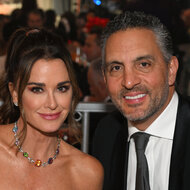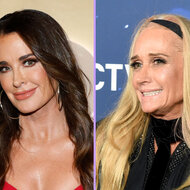
Create a free profile to get unlimited access to exclusive videos, sweepstakes, and more!
Pressure Cooker
Tom Colicchio dishes on Ted Allen's book party.

A big part of being a chef is handling pressure. Whether it's the pressure of coordinating meals perfectly for hundreds of diners each evening, pulling off an intimate dinner-party, or designing and opening a new restaurant. At the end of the day, the pressure is really about exceeding people's expectations. Always. Some cooks thrive on this, drawing fuel from a dynamic, high-stakes environment. Others fold like a beaten egg white. Or crack like a....ok, I'll stop.
Tonight's tasks were designed to see how our chefs operate under extreme pressure. The Quickfire challenge required our chefs to create a $3.00 appetizer in less than 20 minutes, from a wide array of ingredients. The pressure was on to make interesting choices and then follow through with ideas and execution. And under those circumstances, the usual candidates were the ones who shone: Stephen, Harold, Lee Anne and Tiffani.
Off-camera, I strolled through the kitchen and had a taste. Lee Anne's deep-fried oysters with lemon cream were delicious. Ditto for Harold's trevisano with gorgonzola brulee. Absolutely fantastic. Miguel's antipasto was unimpressive. Tiffani's oyster trio was simple, elegant and flavorful. Andrea's B.M.-inducing slaw wasn't anything to write home about, despite its worthy medicinal qualities. Dave's food looked like something from Bennigan's -- chicken skewers with a dipping sauce...ho hum.
And then there was Stephen... As I watch him work, I can see that he is mimicking the pioneers of avant-garde cooking; Like Pierre Gagnier - a genius who wrote the book on atypical plating - his dishes are filled with shocks of food, playful squiggles of sauce, and beautiful use of white space. Or Wylie Dufresne, who has made his name experimenting with texture and far-out flavor combinations on Manhattan's Lower East Side. Stephen isn't reinventing the wheel here; he's copying some of the greats. And in doing so, he's certainly separating himself from the pack, which is important in a competition. Ted Allen was clearly impressed by Stephen's daring presentation, and awarded him immunity. But to my thinking, while an avant-garde presentation can be cool, without mind-blowing flavor, it leaves me cold. I felt that Stephen's morsels of baby manila clams with sea beans were tasty enough, but not Delicious (Capital D). The presentation would have worked at Ferran Andria's famous El Bulli, in the hills north of Barcelona, where a typical 20-course tasting menu demands that each course be just that - a taste. But as a stand-alone appetizer...it wasn't my cup of tea.
That said, giving Stephen immunity did make for an interesting situation in our Elimination Challenge, which had our chefs prepare a multi-course dinner party in honor of Ted's upcoming book release. Tiffani wisely suggested that Stephen take responsibility for dessert because all of the chefs feel weakest in pastry, and he had the least to lose. I guess my presence in the kitchen was the inspiration Stephen needed to agree. He looked like a deer caught in the headlights, but he went ahead with it and acted like a team player. A bit of history: I met Ted Allen about four years ago at my own book party, so it was a thrill to help him with the debut of his own new book, The Food You Want to Eat. And despite my disagreement with his choice of Stephen in the Immunity Challenge, I'm a fan of him and his show. (OK...I've never watched his show. My wife made me write that.) But he was a fun and engaging guy, and it was great to have him on the panel with us.
But let's get back to the show's theme - pressure. I've been asked to prepare many dinners for guests' landmark events - marriage proposals, anniversaries, etc. It's flattering, but unnerving -- you aren't just making a meal...you're creating a memory. If anything goes wrong, the guest of honor will never just chalk it up to an 'off night.' Since professional chefs face that kind of pressure daily, we wanted our chefs to experience it for themselves. All the chefs were responsible for the ingredients of 'their' dish, and you could see their excitement at finally getting a chance to shine in their area of strength - even Stephen, who committed fully to his chocolate course.
Of course, the knife block changed all that.
When the chefs learned they would be preparing someone else's dish, you could feel the hostility and dismay coming off them in waves. I understood why - they had invested so much of themselves in the planning of their dishes. But I also feel that this was a real opportunity to assess the caliber of our players - talented chefs grow more creative in the face of adversity, not less. And while a real chef may not be happy about being thrown a curveball, they sure as hell can't have a meltdown because an entire kitchen is looking to them to figure it out.
Enter Miguel. He was reassigned Lee Anne's cheese course of fourme d'ambert, a creamy, dense cow's milk blue cheese, with a bright counterpoint of beet sorbet. In the bustle of his station, he accidentally dumped salt in the beet puree instead of sugar. Oops. First of all, this mistake tells me he must have picked up a cup of salt and dumped it into the saucepan, rather than using his hands. To an experienced cook, the difference between the feel of salt and the feel of sugar is palpable. Everyone has grabbed salt accidentally for sugar at one point or another, but if you're using all your senses, including touch, it's easy to stop yourself in time. (And before people start demanding I bring back Ken - it is appropriate, essential even, to use your hands during the cooking process. But hand to mouth and back again - not ok.) Faced with this mishap, Miguel started to unravel. He lacked the ability to regroup and assess.
Andrea, characteristically, stepped in to help, but Miguel's disorganized thinking and panicked response showed him to be a potential liability one day in his own kitchen. I was also underwhelmed by Miguel's inability to learn the name of his cheese - it was the central ingredient in the dish! Nerves or no nerves, I feel a Chef should be knowledgeable about the food he is serving.
Despite her kindness, I also had a problem with Andrea's performance. She complained that latkes "aren't my scene" because she likes to make healthy food - but what is inherently unhealthy about potatoes, smoked scallops and caviar? If frying pancakes was her issue, Andrea could have found a way to interpret the ingredients according to her own taste and inclination. For example, she could have cooked the potatoes with a small amount of broth or water, sea salt and fresh herbs to make a chunky soup - a modern take on vicchysois - folded in the scallops and finished the dish with a dollop of creme fraiche and caviar, for a healthy twist on the ingredients she inherited. Instead, resigned to Miguel's vision, she served a lackluster dish of cold potato latkes piled with scallops and caviar.
Dave's John Dory poached in Court Bouillon (a classic fish poaching broth made from water, vegetables and vinegar) wasn't terrible but it tasted as though all the components had been cooked separately -- they never coalesced into a real dish.
Ted felt Dave was so preoccupied with respecting Andrea's original vision that he failed to inject any of himself into his work. This is characteristic of Dave's caring nature, but his lack of solid technique and his emotional wobbliness could definitely undercut his chance at winning. I've yet to meet the guests willing to pay good money to help a chef through his personal issues. Sorry, Dave...it really is about the food.
The chefs with the most experience handled the challenge calmly and found a way to make it their own. Lee Anne was a case in point: She took Tiffani's concept of duck, gnocchi and figs and ran with it: She roasted the breast, made a confit of the leg (confit is the French term for 'preserve' - here a duck leg is cured in a combination of salt and duck fat) and served them with fig compote-stuffed gnocchi. The dish was decadent but nicely balanced. Even though Tiffani's concept wasn't really Lee Anne's style, she had the technique and versatility to pull it off.
Tiffani also put her unique, confident stamp on Harold's beef dish by introducing flavorful fois gras fat into the bordelaise sauce rather than the typical bone marrow. The dish, "Beef a la Harold" was delicious and well executed.
I was impressed with Stephen's decision to team up with Harold on their two dishes. Since he had immunity, and Harold poses a real threat to him winning, Stephen could have left Harold to struggle alone through the complicated dessert course. But Stephen's own pride wouldn't allow him to abandon his idea, so the two worked together and emerged with not one, but two great dishes. Gail felt that Harold's chocolate creme was too rich, but I was impressed that he tackled a dish with a high degree of difficulty, despite a lack of dessert training, rather than opting to create a less-risky chocolate preparation.
The dinner party came off well and Ted was pleased. But it was clear to us that certain dishes were inspired - excellent even. Others weren't. And we caught a whiff of the dynamics in the kitchen. When it came time to judge, Ted took Andrea to task for letting her philosophy of food override her ability to wow people, which is what a chef needs to do. And we came down hard on Miguel for letting his nerves get a hold of him; his lack of composure could have potentially derailed the entire meal.
Part of being a chef is accepting that sometimes you have to fire people, often for the greater good of the organization. Is it more important to be liked or to be great? We all try for both, but it isn't always possible. That's why I put the question of who should go home to Tiffani, Lee Anne, and Stephen - I wanted to see how they would decide if this meal had come from their own kitchen. Lee Anne tried to stick up for Miguel (while not denying his meltdown). Tiffani was clear that he should go - but there's been some bad blood between them for a while. Stephen made the point that Miguel may have messed this challenge up, but overall he is stronger than some others in the group.
At the end of the day we made our decision not according to kitchen heroics or hysterics, but by the food. Despite Miguel's panic, he turned out a decent, if uninspired, dish. Andrea, on the other hand, failed to execute hers well and lacked the ideas and technique to turn it into something special. In short, she had 'checked out' and it showed. When the cameras were off, Andrea confessed that she hadn't come to Top Chef to win, but rather to make an impact on how people eat. My answer to her was: if you hadn't won an immunity challenge and stepped up your game to get to this point, how much of an impact could you have ultimately hoped to make? Winning - ambition - isn't such a bad thing when you have a message to convey. Maybe it was fatigue, maybe she's just too darn nice, but Andrea just didn't want it badly enough.
And for the record - I ran into Miguel recently here in New York City and guess what? He remembered the name of the cheese.


